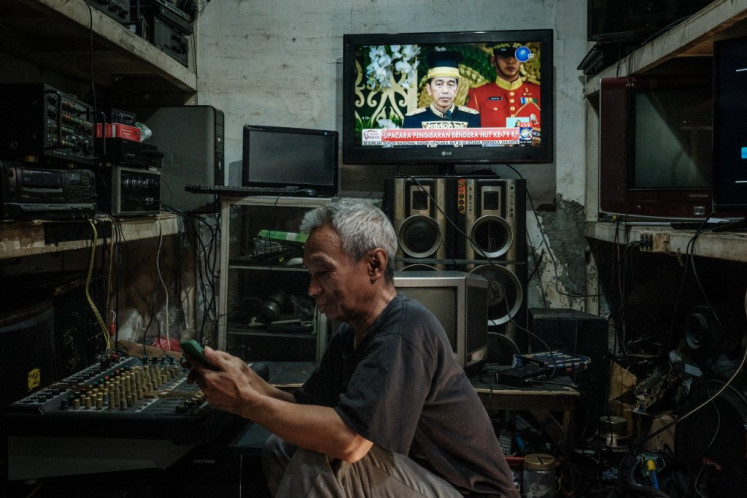Black Americans suffer from generations of economic marginalization
Black Americans make 73 cents for every dollar made by white Americans, with a poverty rate two-and-a-half times higher, according to the Economic Policy Institute think tank.
Change text size
Gift Premium Articles
to Anyone
 Protesters have a moment of silence during a rally against the death in Minneapolis police custody of George Floyd, in the Manhattan borough of New York City, US, on Monday. Black Americans make 73 cents for every dollar made by white Americans, with a poverty rate two-and-a-half times higher, according to the Economic Policy Institute think tank. (Reuters/Jeenah Moon)
Protesters have a moment of silence during a rally against the death in Minneapolis police custody of George Floyd, in the Manhattan borough of New York City, US, on Monday. Black Americans make 73 cents for every dollar made by white Americans, with a poverty rate two-and-a-half times higher, according to the Economic Policy Institute think tank. (Reuters/Jeenah Moon)
D
owntown Washington gleams with wealth, but as he stood in a crowd protesting at the White House, Justin Monroe doubted he would ever share in that prosperity.
"It just ain't for certain people. A lot of certain people," Monroe, an African American, told AFP. "We can't make that money. They don't want us to make that money."
A restaurant cook who lost his job to the coronavirus pandemic shutdowns, Monroe, 25, lives in a part of the nation's capital separated by a river from the upscale offices and government buildings downtown.
He views the police violence that sparked nationwide protests as the norm for black Americans, not an exception.
"I don't like them," he said of the police. "I don't like seeing a lot of my fellow race getting shot by cops."
The police killing of George Floyd in Minneapolis led to diverse protests calling for an end to violence towards African Americans, who studies have found face an elevated risk of dying at the hands of law enforcement.
Yet the inequalities facing African Americans go deeper than just interactions with police: from lower wages to longer commute times, the structure of the world's largest economy deeply marginalizes black people.
"African Americans have always been full participants in the US economy, they're just not full recipients," said Nicole Smith, chief economist at the Georgetown University Center on Education and the Workforce.
A vast gap
Before Floyd died under the knee of a white police officer on a city street, the coronavirus pandemic already had taken a grievous toll on the United States, killing more than 106,000 people and costing 42 million lost jobs.
And even the illness discriminates: Black Americans make up 13.4 percent of the population but comprise 22.9 percent of COVID-19 deaths, according to the Centers for Disease Control and Prevention.
They also are over-represented in the unemployment rate, which jumped to 14.7 percent for all workers in April but 16.7 percent for African Americans, according to the Labor Department.
And the economy disadvantaged black Americans long before the pandemic.
They make 73 cents for every dollar made by white Americans, with a poverty rate two-and-a-half times higher, according to the Economic Policy Institute think tank.
The gap is so wide that the Cleveland Federal Reserve Bank estimated last year that the wealth of the average white household is about 6.5 times more than the average black household – roughly the same as it was in 1962.
In an optimistic scenario, black Americans will mostly catch up to whites in about 200 years. But, because of the pandemic, Cleveland Fed senior research economist Dionissi Aliprantis warned in an interview that "most of the gaps will grow."
Rooted in racism
Even after slavery was abolished in the mid-nineteenth century, generations of racist laws and practices segregating black Americans to certain neighborhoods and depriving them of access to financial services fuel the inequities and continue to haunt American cities.
Home ownership is key to building intergenerational wealth, but a 2018 Brookings Institution study found that homes in neighborhoods where at least half the residents are black are valued at 50 percent less than neighborhoods where no residents are black.
African Americans also spend more time getting to work than any other group, a 2014 University of Chicago study found, since they often live in neighborhoods with fewer jobs and worse transportation links.
Even a person's name can harm them, according to a 2016 study by University of Toronto and Stanford University researchers, who found that African Americans who attempt to conceal their race on resumes get contacted by employers at more than twice the rate of those who do not.
"I'm definitely at a disadvantage for one, just coming out of college and being a minority," said Emmanuel Sanchez, a black student approaching the end of his studies who also joined the protests outside the White House.
A host of federal laws prohibit open discrimination, yet many black Americans says they feel bias is part of daily life.
"Being an African-American male, I had to overcompensate for a lot of things to be an equal in society," said Devyn Brown, who was laid off from a good-paying job at a telecommunications firm in San Diego due to the pandemic.
Smith said the divide saps economic potential. She points to her research showing black Americans' earnings could be US$186 billion higher if their educational attainment levels were the same as high-income whites.
"It's a cascading set of systematic racism that really leads us to where we are today," she said of the disparities, "and probably leads us to this boiling pot that we're experiencing across the nation."









